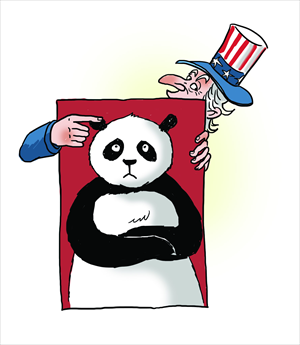Who has real imperial goals in Central Asia?

A recent issue of The National Interest published an article by two European scholars, Raffaello Pantucci and Alexandros Petersen, titled "China's Inadvertent Empire." The authors argue that China will dominate Central Asia while the US will become an outsider.
Is China to dominate Central Asia? This doesn't seem to be the case. Just a few days ago, Japan invested $700 million in Central Asia, reportedly to woo the region to take Japan's side over the Diaoyu Islands issue.
There are several problems with the abovementioned argument about China's "dominance" in Central Asia.
The planned US withdrawal from Afghanistan is only a statement at present. Whether it will be carried out remains to be seen. Even if the US does so, it is because it has been thwarted by the Taliban. And this has nothing to do with China.
Meanwhile, Russian strategists often view Central Asia as their country's backyard. After the 2008 Georgia-Russia conflict, top leaders of Russia Vladimir Putin and Dmitry Medvedev prominently announced that the former Soviet region was Russia's special interest area.
In the last two years, it has established a customs union among Russia, Belorussia and Kazakhstan. It also aims at a Eurasian union in 2015. How could Russia's influence drop to new lows?
Zbigniew Brzezinski, a US political scientist and former national security advisor, referring to Central Asia, that the US is "too distant to be dominant in this part of Eurasia." Russia is "too weak" and China is "too powerful," while it follows that the US' primary interest is "to help ensure that no single power comes to control this geopolitical space."
Here the US' primary interest is to maintain its hegemony, but China's every move in Central Asia is deemed as confronting the US's vital interests.
James C. Mulvenon from the RAND Corporation has criticized some US strategists as only interested in portraying China in a negative light. Pantucci and Petersen apparently cater to certain stereotypes.
According to them, "China may not be seeking an empire in the region, but it is the only power active in a comprehensive, long-term manner. If other outside powers do not also engage, China's lock on Central Asia, to the exclusion of the US, will be not only inadvertent but also inevitable."
China does not interfere with Central Asian countries' internal affairs, nor does it export ideology there. It did not forcibly seize economic benefits or station any troops.
It is the US that practices military exercises in China's neighboring areas and deployed airbase in Kyrgyzstan, which is only a few hundred kilometers from the northwest border of China.
The power that has a broader strategy and wants to become a Central Asian empire is the US. China does not have the ambition to become a global hegemony.
Nevertheless, an influential country cannot be without diplomatic strategy, otherwise it will be driven into a passive situation. Since the fall of the Soviet Union, China has boosted communications with Central Asia. The US' precautionary mentality reminds China that it is time to form a strategy on Central Asia.
The author is director of the Research Institute of Central Asia of the Xinjiang Academy of Social Sciences. opinion@globaltimes.com.cn